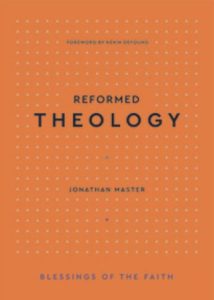 The book, Reformed Theology, 2023, by Jonathan Master is the fourth selection in the Blessings of the Faith series edited by Jason Helopoulos and published by P&R. The author has several years of pastoral experience and was granted the PhD by the University of Aberdeen where he studied aspects of the Westminster Assembly. He is currently the president of Greenville Presbyterian Theological Seminary in South Carolina. The forward is by Pastor Kevin DeYoung of Christ Covenant Church in Matthews, North Carolina. Other titles in the Blessings of the Faith series are Covenantal Baptism by the series editor, Expository Preaching by David Strain, and Persistent Prayer by Guy M. Richard. The book’s one-hundred-eight pages are hardbound with a dustjacket like satin-finish cover adhered to the boards in place of cloth. The handy size makes for a jacket-pocket fit or a suitable addition to a not too stuffed handbag.
The book, Reformed Theology, 2023, by Jonathan Master is the fourth selection in the Blessings of the Faith series edited by Jason Helopoulos and published by P&R. The author has several years of pastoral experience and was granted the PhD by the University of Aberdeen where he studied aspects of the Westminster Assembly. He is currently the president of Greenville Presbyterian Theological Seminary in South Carolina. The forward is by Pastor Kevin DeYoung of Christ Covenant Church in Matthews, North Carolina. Other titles in the Blessings of the Faith series are Covenantal Baptism by the series editor, Expository Preaching by David Strain, and Persistent Prayer by Guy M. Richard. The book’s one-hundred-eight pages are hardbound with a dustjacket like satin-finish cover adhered to the boards in place of cloth. The handy size makes for a jacket-pocket fit or a suitable addition to a not too stuffed handbag.
The author introduces his subject saying the book is the product of two convictions: “The first is that knowing what we believe about God, humanity, worship, and salvation is important,” and the second is “Reformed theology is a blessing” (13-14). He lays out the fundamentals of Reformed theology in four chapters—What is Reformed Theology?, Scripture and God’s Sovereignty, The Covenants, and The Blessings of Reformed Theology. The subjects covered are familiar to those with a Reformed background—the solas of the Reformation; the importance of Covenants; the TULIP acrostic used by later Calvinists to summarize the Genevan’s soteriology; the covenantal significance of infant baptism; predestination and election; and the significance of confessions and catechisms for doctrinal anchors and educational instruction.
Essential to Master’s presentation is “God’s sovereignty over all” (41-42) and the authenticity of his spoken infallible Word from Genesis 1:1 through Revelation. The section titled “Why Does the Bible Matter so Much?,” answers the question simply, because it mattered to Christ. One defense of the divine origin of Scripture used by Jesus is his respect for the Old Testament exemplified in how he speaks about and quotes Scripture (35-37). For me, in this age when the Bible is increasingly demeaned and treated as a religious work among others not only by the general public but also by some professing Christianity as well, Master points out that 400 years after Malachi ended the Old Testament canon Jesus quoted it authoritatively as the Word of God. A verse that may have helped the author’s case is Luke 4:21 that speaks of Jesus reading the scroll of Isaiah 61:1-2 and then informing those gathered in the synagogue “Today this Scripture has been fulfilled in your hearing.” This verse really ties together the two testaments as the Lord directly affirms Isaiah’s prophecy fulfilled in himself and that all he would soon accomplish in his ministry fulfills prophecy.
One section of the book, “Questions and Answers on Reformed Theology,” is helpful because the author gives answers to fourteen questions about Reformed theology that inquirers often ask. I thought one was thoroughly appropriate and a bit humorous.
Many people who claim to be Reformed are prickly or obnoxious. Why is this?
It has been a long time since I have seen the word prickly used, but Oxford defines it as “liable to cause someone to take offense” which is precisely what Master’s question addresses. His answer includes texts in 2 Timothy and 1 Corinthians. He also observes that enthusiasm about the gospel and the Bible are good, but enthusiasm should be tempered with humility and gratitude. Other questions posed are: does one need to know theology to know God more deeply; what does Reformed theology teach about the Holy Spirit; how does one find a Reformed church; and one I found curious, “Isn’t Reformed worship like Roman Catholic worship?—had not heard that one.
Dr. Master’s book provides a handy guide for the basics of Reformed theology, free of jargon, and clearly written. Pastors can distribute the book to inquirers with confidence the content will instruct them well. The volume could be used for a four-week small group study or maybe a Friday evening to Saturday retreat for men, women, or youth. The author emphasizes the importance of understanding the essentials of theology from the British perspective via the Westminster Confession and catechisms, as well as the continental standpoint through the Belgic Confession, Heidelberg Catechism, and Canons of Dort. These historically proven confessional standards, he adds, provide spiritual comfort and knowledge that builds a firm foundation for faith and sanctification. As the author points out, the Reformation was built on Scripture and developed unity with confessional standards, so if Christianity today is to unite for the gospel in an age increasingly facing persecution, it needs to know what it believes, and the confessions of Reformed theology provide the best source. Master’s Reformed Theology is a fine book for our times as Evangelicalism increasingly wanders in me-ism and has lost its sense of the greatness of God. The first question of the Westminster Shorter Catechism sets forth the basics, “What is man’s chief end?,” the answer is, “Man’s chief end is to glorify God and enjoy him forever.” Let’s get back to confessions and Reformed theology.
Barry Waugh
Notes—The book read by the reviewer was purchased by him. Chester is where Matthew Henry ministered, see his biography on this site, “Matthew Henry, Presbyterian Minister and Bible Commentator.” The picture was chosen because of what is said on the building. It encourages Christians to grasp the greatness and power of God that Reformed theology can bring to students much as a good child fears his father while knowing he is loved.





